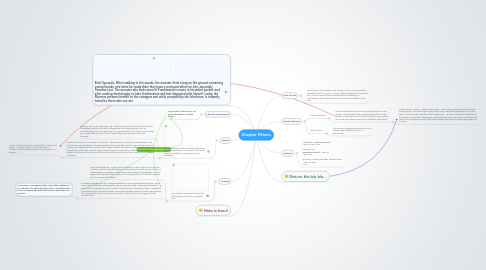
1. Brief Synopsis- When walking in the woods, the monster finds a bag on the ground containing several books, and when he reads them they have a profound affect on him, especially Paradise Lost. The monster also finds some of Frankenstein's notes in his jacket pocket, and after reading them begins to hate Frankenstein and feel disgusted with himself. Lastly, the Monster presents himself to the cottagers and while accepted by the blind man, is instantly hated by those who can see.
2. Character Development
2.1. The monster's hate is born. For more, see creation and birth theme.
3. Themes
3.1. The most prevalent themes in this chapter are- Ignorance is bliss; Evil is created, not inherent; Creation and birth; Appearances can be deceiving.
3.1.1. Appearances can be deceiving- The Monster reveals himself to the blind man and is accepted, yet when the other cottagers see him they persecute him, not understanding that he is a good man. This goes to show that if they wouldn't judge the monster based only on how he looks, they would see more of his true character.
3.1.2. Creation and birth, Evil is created, not inherent- After reading the notes from Frankenstein's coat and discovering Frankenstein's feelings towards the monster, the monster begins to feel emotions of anger and disgust, which are new for him. These newfound emotions are directed both towards himself and Frankenstein, yet the anger is focused primarily around his creator. This development relates to the theme of creation and birth, as this is the moment when the Monster's hatred begins to blossom.
3.1.2.1. "I read. 'Hateful day when I recieved life' I exclimed in agony. 'Accursed creator! Why did you form a monster so hideous that even you turned from me in disgust?"
4. Allusions
4.1. The Monster reads several books, the most important of which is Paradise Lost.
4.1.1. One of the books the Monster read is Sorrows of Werter, and it is not until the monster reads this book that ideas such as death and suicide are placed into his understanding. This relates to the theme of the danger of knowledge, and also supports the idea that the monster is not inherently evil, but rather became evil over the course of his lifetime.
4.1.2. In reading Paradise Lost, the Monster understood it as a completely factual history, which caused him to develop many negative opinions about himself. He compares himself to Adam and Frankenstein to God. However, he notices that Adam was created in perfection and loved by God, while the Monster was made of broken pieces and hated. Recognizing this, the monster feels he is more connected to Satan than God, and begins to hate himself/his life.
4.1.2.1. "Many times I considered Satan as the fitter emblem of my condition, for often, like him, when I viewed the bliss of my protectors, the bitter gall of envy rose within me"- Monster
5. Point of View
5.1. The narrator in this chapter is the monster, so it is very important to remember that he is giving a version of the story that will only benefit him. It is also important to remember that he is speaking to Frankenstein, and is therefor trying to convince Frankenstein of his case.
6. Literary Elements
6.1. Gothic Elements
6.1.1. There are several accounts of overwrought emotion in this chapter, especially when the monster speaks of his hatred towards Frankenstein and his shock of discovering emotions. Also, there are extreme accounts of infatuation with nature.
6.1.1.1. Intense Nature Loving- "Autumn passed thus. I saw, with surprise and grief, the leaves decay and fall, and nature again assume the barren and bleak appearance it had worn when I first beheld the woods and the lovely moon. Yet I did not heed the bleakness of the weather; I was better fitted by my conformation for the endurance of cold than heat. But my chief delights were the sight of the flowers, the birds, and all the gay apparel of summer."
6.2. Byronic Hero-
6.2.1. The monster struggles with who he is in this chapter, after discovering he is an abomination.
